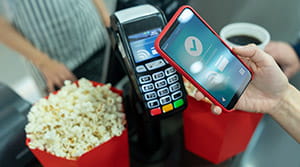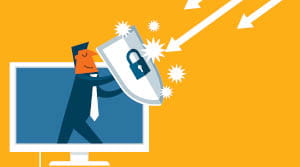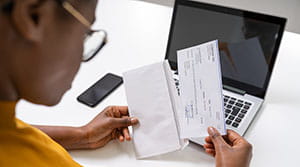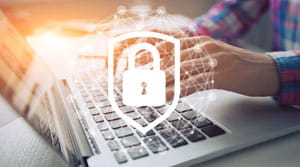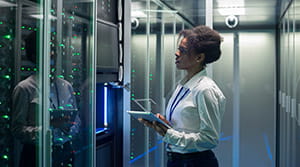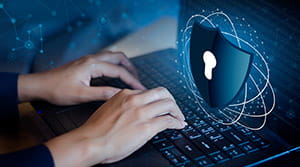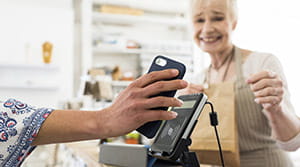Cybersecurity: Fortify your business from the risks of remote work

Hybrid and remote work are now commonplace in today’s business world. In addition to easing the costs of commercial real estate and facilities maintenance, the benefits include reducing employee commutes and potentially boosting morale. But allowing team members access to your company’s technology infrastructure from home is not without challenges.
If you own or manage a business, it’s essential to understand the risks and how to reduce them. A corporate data breach can result in data theft, identity fraud and ransomware attacks. Taking a proactive approach can help protect vital company and customer information, as well as your business reputation and financial assets.
Remote access can open the door to hackers and fraudsters.
Remote work situations have become a major point of entry from the dark web, especially when individuals use unsecured devices to access their company’s financial platforms. Hackers know and take advantage of weak points, such as remote employees:
- Working from personal devices that may have outdated operating systems or lack proper encryption.
- Sharing sensitive information without encryption.
- Using third-party applications to connect to the cloud.
- Using weak, insecure or recycled passwords and login credentials.
- Utilizing an unsecured Wi-Fi connection.
Even if an individual’s computer is well secured, data can be exposed through secondary devices such as cameras and printers.
Educate and support remote employees to strengthen cybersecurity.
If your company is committed to a remote work model, it’s important to establish protocols and expectations, and educate your employees about them. Teach team members about the risks of sending information through a personal email account or a device with a weak password, or utilizing an unsecured Wi-Fi connection.
Your IT support team should also be easily accessible for remote employees. They should take the time to review the security of each hybrid or remote worker, and walk them through the measures they should be taking, and why.
Key areas for leadership and IT specialists to address as part of your company’s remote work security:
- Secure networking and devices - Require and provide software and tools for employees to encrypt online communications and Wi-Fi connections. Consider requiring employees to use only company-supplied laptops and devices equipped with biometric security measures.
- Use up-to-date systems and antivirus software - Ensure that operating systems are regularly updated with the latest patches and verify that updated antivirus protection and data loss software is active on each employee’s computer.
- Employ strong password protocols - Set strong password requirements and ensure employees know what makes a strong password (at least 12 characters long, uses a combination of letters, numbers and special symbols, no personal information). Also, require employees to update their passwords at regular, set intervals and avoid sharing them or using the same password for other applications.
- Enhance authentication to keep unauthorized users out - Hackers have become increasingly sophisticated in their efforts to hack security measures by exploiting compromised credentials available on the dark web. Improve the security of your virtual private networks by adding Multi-Factor Authentication (MFA) so employees must confirm their identity when trying to access data. If you are using cloud-based email or other cloud-based applications, it is recommended that you turn on MFA to prevent business email compromise. Implementing MFA on your cloud-based apps is essential for enhancing the security of your accounts and protecting your sensitive data. MFA adds an extra layer of authentication beyond just entering a password, making it significantly harder for unauthorized individuals to gain access to your account. Here's why you need MFA:
- Enhanced Security: MFA requires a second form of verification in addition to your password, such as a unique code sent to your phone or a biometric scan. This means even if someone manages to obtain your password, they won't be able to access your account without the second factor.
- Securing Valuable Data: Your email likely contains valuable and sensitive information, including emails, documents, and possibly even financial or personal data. MFA helps prevent unauthorized access to this critical information.
- Maintain consistent monitoring - Continuously monitor your company’s security environment and look for any weaknesses that hackers could take advantage of.
Cybersecurity is a part of business today that simply cannot be trusted to chance. Hackers continue to use a variety of phishing and other schemes to get information from remote and onsite employees, and gain access to company operating systems. At Banner, we work diligently to protect our clients’ data, but we need your help. See the following blogs to learn more about protecting your organization:
The Digital Factor: Four Ways to Boost Your Company's Cyber Security
The Human Factor: Six Ways to Boost Your Company's Cyber Security
Staying One Step Ahead of Cyber Thieves
5 Tips to Prevent Online Fraud
Cyber Hygiene ...What Is It? And 5 Things to Know About It






